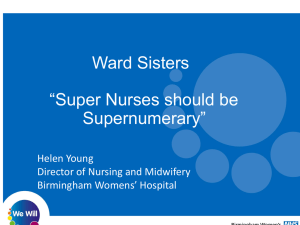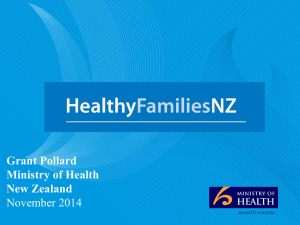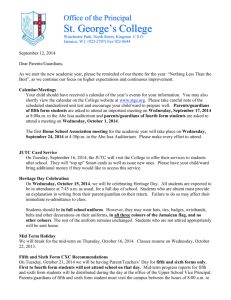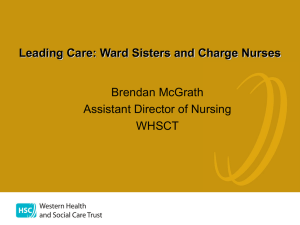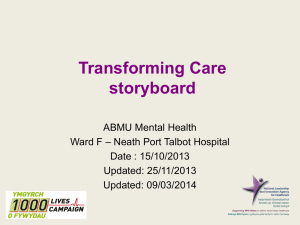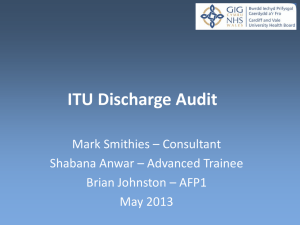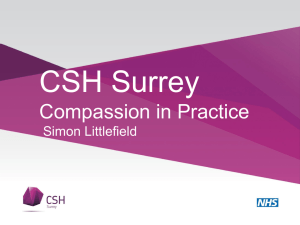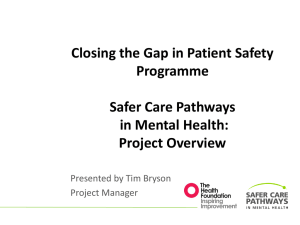Why come last stage? Delays in diagnosis of TB
advertisement
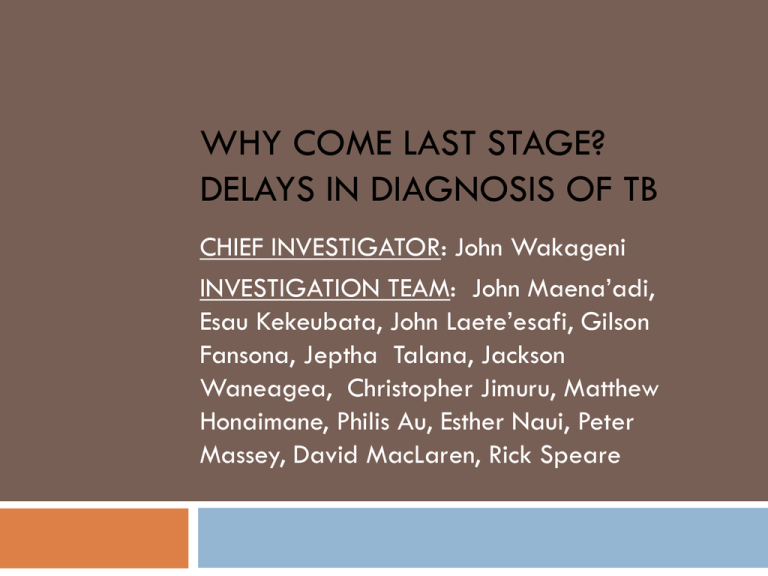
WHY COME LAST STAGE? DELAYS IN DIAGNOSIS OF TB CHIEF INVESTIGATOR: John Wakageni INVESTIGATION TEAM: John Maena’adi, Esau Kekeubata, John Laete’esafi, Gilson Fansona, Jeptha Talana, Jackson Waneagea, Christopher Jimuru, Matthew Honaimane, Philis Au, Esther Naui, Peter Massey, David MacLaren, Rick Speare Introduction Tuberculosis (TB) is a serious infectious disease that is common in the East Kwaio region. TB can cause adults and children to get very sick and even die. The disease can spread through a family and a village. The treatment for TB is 6 months of special antibiotics. Introduction continued Currently the treatment is started in Hospital and then can be finished under supervision at home or in Hospital. The first 2 months of treatment is in hospital and then the next 4 months is at home. To reduce the spread of TB in the community two important ways are by having people come to Hospital early in the illness, and by having babies given a needle for TB (BCG vaccine). Study objectives To explore some of the reasons why people come to Hospital in last stage of TB. To use this information to design a larger project to better understand the reasons and to make suggestions for changes to health programs. Sample Purposive sample. Three people chosen from patients who had been admitted to Atoifi Hospital for TB treatment. One each from coastal, lower mountain slope, high mountain areas. Methods This study was a Qualitative study: structured interview, talking survey. The TB Program leader (John Wakageni) at Atoifi Hospital found names of people who came to Hospital for TB The researchers (Esau, Christopher and Gilson) visited the person’s home and asked them to be a part of the research. They conducted a talking survey, structured interview in language or pijin. The interview were recorded on a digital recording device. The interviews were then written out in language and pijin. Data was analysed by looking for common themes and different issues. Findings Participant 1: Male 40 yrs. Ancestral Religion. Mountain History: Admit TB Ward 2007. Re-admit 2011. Issues why come to hospital at late stage of TB. “Becos no ani seleni, hem farawe, wanem mi doim so mi mekem lo saed lo kastom nao. Olsem sekrifaes den faendim seleni befor mi kam. Wans mi no faendim seleni, had for kam nao ia. Cos far awe den fae blo kanu hem tumas ia.” “So 10 fala pig. Sekrifaes for mi kam lo hia for no ani ting for stopim medicin mi tekem ia. Supos if mi no sekrifaes nomata mi tekem how mani fala medicin sai bae no woka. Des wai mi mekem sekrifaes for mekim olketa medicin mi usim hemi woka.” Findings Participant 1: Cost – don’t have money for transport or food. People sell pigs to get cash to buy food while they are admitted Distance – many people live in remote locations some up to 3 days walk in the mountains Permission to go to TB Ward from ancestors because it is a tabu place because it is joined to the Maternity Ward. Then need to have reconciliation with ancestors on return. This cost 10 pigs before and 10 pigs after entering the TB Ward. Findings Other reasons why participant 1 came late for TB treatment at Atoifi: Traditional Medicine – used before coming to hospital and when hospital medicine did not work Social Isolation – knew that when come to hospital he had no wantoks and so was very lonely with no one to care for him or talk with him. Findings Participant 2: Male 60 years. SDA. Coastal History: Start sick 2006 admit to TB ward 2009. Issues why come to hospital at late stage of TB. Tried traditional medicine but did not recover Then admitted to hospital for TB treatment in 2009 but after discharge not recover Findings Participant 2: continued Came back to hospital 3 times for check but nurse told him you are OK and no need for more TB checks. After that although fever, cough and coughing up blood for one year did not come to hospital because he felt ashamed to come back because the nurse had told him he was OK– so stay at home. “Ngaia e fata. ‘Io lo’o mola no’ona mani mamalo ga’u mai’. Na’u taku Mamalo uta’a la’u? late’e olo’ori oru singari esui ma taku seke la’u. Mai gaia ame aga mola fai.” “He said. ‘Now you just wait’. How will I wait? This kind of thing after three months I will check again. He (the nurse) didn’t do it (the TB test).” Research team encouraged participant to come to hospital for check. He came next day. Findings Participant 3: Family- Father, Mother, children and grandchildren (12 people in one house, no window). Catholic. Lower Mountain slope. History: 2 adults and 3 children admitted for TB between 2007 – 2009. Issues why come to hospital at late stage of TB. Children between 6-16 yrs came to hospital as soon as sick – admitted to TB Ward. Father – 60yrs. Chronic cough – test for TB negative Findings Father – 60yrs. “Ki koko’o no’o ola bala alata ada no’o aki mae no’o. Kwa’a ki gou’u gou’u melesin ma olate’e ato mola” “I am very old now about the point of death. Even if I drink the medicine it will not work” “ Dr e makemu nau lau’u maka ngari nau na X ray. Maki kwairii no’o dari nau’u. Ma ola abulo’onga ada mola.” “Dr checked me, he checked me with the X ray. Then he told me about but it, I just ignored it. Discussion Reasons why people come late to Hospital for TB: Old and time to die, so no need even if TB symptoms Choose to not to follow advice from hospital Ask for TB check and told no need by staff causing shame so don’t want to come back Cost – transport and food. Sell pigs to get cash to buy food at Atoifi because no food from hospital Distance – many people live in remote locations some up to 3 days walk in the mountains Discussion continued Permission to go to TB Ward from ancestors because it is a tabu place because it is joined to the Maternity Ward. Then need to have reconciliation with ancestors on return. This costs 5-15 pigs before and after entering the TB Ward. Traditional medicine Social isolation Conclusions and Recommendations This pilot research project has shown that there are many important reasons why people come to Hospital late in their TB. Each reason needs to be addressed to allow people to come to Hospital early. The information from this survey should make the start of a larger project to fully explore these reasons so changes can be made. A TB Ward that is away from the Maternity Ward and not connected to the main hospital is needed, particularly for people from the mountains.
